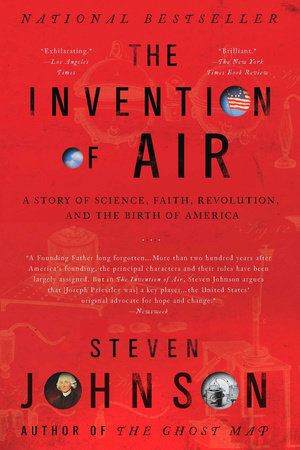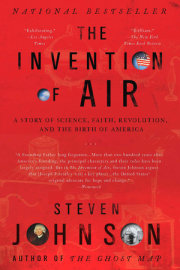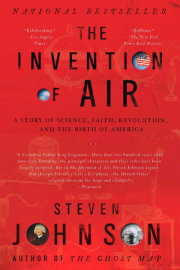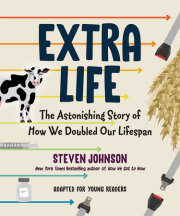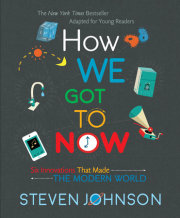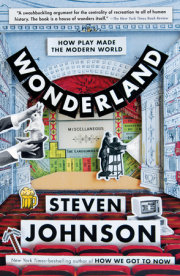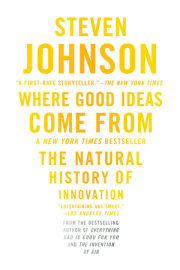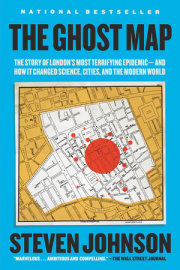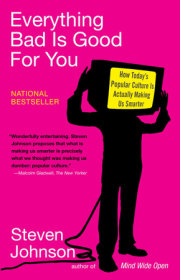Table of Contents
Title Page
Copyright Page
Dedication
Epigraph
CHAPTER ONE - The Electricians
CHAPTER TWO - Rose and Nightshade
CHAPTER THREE - Intermezzo: An Island of Coal
CHAPTER FOUR - The Wild Gas
CHAPTER FIVE - A Comet in the System
Acknowledgements
NOTES
BIBLIOGRAPHY
ALSO BY STEVEN JOHNSON
Interface Culture:
How New Technology Transforms the Way We Create and Communicate
Emergence:
The Connected Lives of Ants, Brains, Cities, and Software
Mind Wide Open:
Your Brain and the Neuroscience of Everyday Life
Everything Bad Is Good for You:
How Today’s Popular Culture Is Actually Making Us Smarter
The Ghost Map:
The Story of London’s Most Terrifying Epidemic—and How It Changed
Science, Cities, and the Modern World
RIVERHEAD BOOKS
a member of Penguin Group (USA) Inc.
New York 2008
RIVERHEAD BOOKS
Published by the Penguin Group
Penguin Group (USA) Inc., 375 Hudson Street, New York, New York 10014, USA Penguin Group (Canada), 90 Eglinton Avenue East, Suite 700, Toronto, Ontario M4P 2Y3, Canada (a division of Pearson Canada Inc.) Penguin Books Ltd, 80 Strand, London WC2R 0RL, England Penguin Ireland, 25 St Stephen’s Green, Dublin 2, Ireland (a division of Penguin Books Ltd) Penguin Group (Australia), 250 Camberwell Road, Camberwell, Victoria 3124, Australia (a division of Pearson Australia Group Pty Ltd) Penguin Books India Pvt Ltd, 11 Community Centre, Panchsheel Park, New Delhi-110 017, India Penguin Group (NZ), 67 Apollo Drive, Rosedale, North Shore 0632, New Zealand (a division of Pearson New Zealand Ltd) Penguin Books (South Africa) (Pty) Ltd, 24 Sturdee Avenue, Rosebank, Johannesburg 2196, South Africa
Penguin Books Ltd, Registered Offices: 80 Strand, London WC2R 0RL, England
Copyright © 2008 by Steven Johnson
All rights reserved. No part of this book may be reproduced, scanned, or distributed in any printed or electronic form without permission. Please do not participate in or encourage piracy of copyrighted materials in violation of the author’s rights. Purchase only authorized editions. Published simultaneously in Canada
Johnson, Steven, date.
The invention of air : a story of science, faith, revolution, and the birth of America / Steven Johnson.
p. cm.
Includes bibliographical references and index.
eISBN : 978-1-440-68531-6
1. Priestley, Joseph, 1733-1804. 2. Chemists—Great Britain—Biography.
3. Scientists—Great Britain—Biography. I. Title.
QD22.P8J
540.92—dc22
[B]
While the author has made every effort to provide accurate telephone numbers and Internet addresses at the time of publication, neither the publisher nor the author assumes any responsibility for errors, or for changes that occur after publication. Further, the publisher does not have any control over and does not assume any responsibility for author or third-party websites or their content.
For Jay
The English hierarchy (if there be anything unsound in its constitution) has equal reason to tremble at an air pump, or an electrical machine.
—JOSEPH PRIESTLEY
That ideas should freely spread from one to another over the globe, for the moral and mutual instruction of man, and improvement of his condition, seems to have been peculiarly and benevolently designed by nature, when she made them, like fire, expansible over all space, without lessening their density at any point, and like the air in which we breathe, move, and have our physical being, incapable of confinement or exclusive appropriation.—THOMAS JEFFERSON
AUTHOR’S NOTE
A few days before I started writing this book, a leading candidate for the presidency of the United States was asked on national television whether he believed in the theory of evolution. He shrugged off the question with a dismissive jab of humor. “It’s interesting that that question would even be asked of someone running for president,” he said. “I’m not planning on writing the curriculum for an eighth-grade science book. I’m asking for the opportunity to be president of the United States.”
It was a funny line, but the joke only worked in a specific intellectual context. For the statement to make sense, the speaker had to share one basic assumption with his audience: that “science” was some kind of specialized intellectual field, about which political leaders needn’t know anything to do their business. Imagine a candidate dismissing a question about his foreign policy experience by saying he was running for president and not writing a textbook on international affairs. The joke wouldn’t make sense, because we assume that foreign policy expertise is a central qualification for the chief executive. But science? That’s for the guys in lab coats.
That line has stayed with me since, because the web of events at the center of this book suggests that its basic assumptions are fundamentally flawed. If there is an overarching moral to this story, it is that vital fields of intellectual achievement cannot be cordoned off from one another and relegated to the specialists, that politics can and should be usefully informed by the insights of science. The protagonists of this story lived in a climate where ideas flowed easily between the realms of politics, philosophy, religion, and science. The closest thing to a hero in this book—the chemist, theologian, and political theorist Joseph Priestley—spent his whole career in the space that connects those different fields. But the other figures central to this story—Ben Franklin, John Adams, Thomas Jefferson—suggest one additional reading of the “eighth-grade science” remark. It was anti-intellectual, to be sure, but it was something even more incendiary in the context of a presidential race. It was positively un-American.
In their legendary thirteen-year final correspondence, reflecting back on their collaborations and their feuds, Thomas Jefferson and John Adams wrote 165 letters to each other. In that corpus, Benjamin Franklin is mentioned by name five times, while George Washington is mentioned three times. Their mutual nemesis Alexander Hamilton warrants only two references. By contrast, Priestley, an Englishman who spent only the last decade of his life in the United States, is mentioned fifty-two times. That statistic alone gives some sense of how important Priestley was to the founders, in part because he would play a defining role in the rift and ultimate reconciliation between Jefferson and Adams, and in part because his distinctive worldview had a profound impact on both men, just as it had on Franklin three decades before. Yet today, Priestley is barely more than a footnote in most popular accounts of the revolutionary generation. This book is an attempt to understand how Priestley became so central to the great minds of this period—in the fledgling United States, but also in England and France. It is not so much a biography as it is the biography of one man’s ideas, the links of association and influence that connect him to epic changes in science, belief, and society—as well as to some of the darkest episodes of mob violence and political repression in the history of Britain and the United States.
. All rights reserved. No part of this excerpt may be reproduced or reprinted without permission in writing from the publisher.

